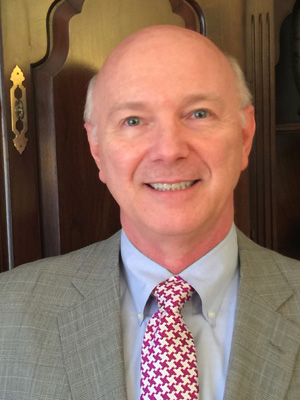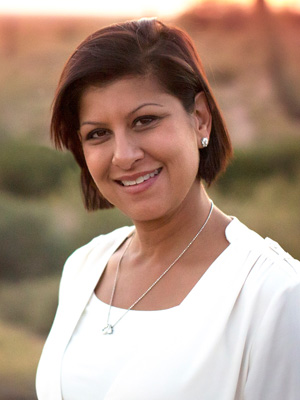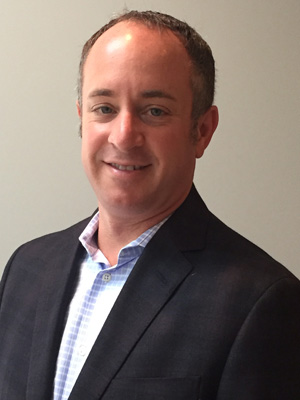Careers Outside The Clinic
Some physicians find rewarding careers in alternative paths to clinical practice. They discover niches in the pharmaceutical world, health care administration, and research, among other fields. Three alumni of the College of Medicine and its predecessor institutions represent many who take pride in doing work that makes a significant impact on the health and wellness of a broad spectrum of patients, as well as the field of health care in general. Here are their stories.
Charles Tressler, MD, HU '80
Senior Director, Safety Risk Management Lead, Pfizer

Charles Tressler, MD, HU '80
Early in my career, when I was in clinical practice as an ophthalmologist at Walter Reed Army Medical Center, my day was built around taking care of patients, answering their questions, writing prescriptions, the ebb and flow of life in the office. I wondered sometimes if there was a connection between patients in terms of the problems they were presenting, but by the time I started thinking about it, the phone rang, or I had to be off to the next patient, answering other questions.
I wondered how to reconcile my desire to have a continual learning of the latest medical information and still have my hand in clinical medicine.
One day, I got a call out of the blue from a pharmaceutical recruiter asking if I'd be interested in a research and development position involving new medications and devices for the treatment of ophthalmic diseases. What a stroke of luck that was! My undergraduate degree was in pharmacy so this was a natural interest for me.
I took the position and was responsible for reviewing the new ophthalmic medicines in development and in the company's pipeline, trying to determine which of these drugs could make it from the bench to the bedside or if better alternatives to current treatment were possible. I enjoyed my involvement in clinical studies because I could see firsthand the results patients were having with new medications.
After working for Pharmacia, Pfizer and Merck, I returned to Pfizer, where I've been since 2006, first in research and development and now in safety surveillance and risk management. I migrated to the safety side because many drugs on the market have some type of adverse ocular events. I was asked to evaluate these events, consider how to manage them, and how to design studies to assess the level of risk.
Also in this role, I ensure that the correct terminology is used to describe adverse events so we don't create unnecessary chaos. For example, staff members would use the word blindness to describe an adverse event when they might just mean blurred vision. I also provide guidance for study design for the assessment of ophthalmic adverse events associated with drugs in development.
This career path has enabled me to practice medicine without having to worry about the business of medicine. In addition to my work at Pfizer, I am a clinical instructor in a glaucoma clinic at Yale University School of Medicine where I teach residents a few times a month. It's very rewarding to work with younger doctors, to be challenged by them in the ways we treat patients, and to be able to share learned experiences from time in medical practice. Seeing patients in the clinic also helps to keep you current, and that carries value when you render a professional opinion with colleagues.
Pursuing this career path has made me feel more fulfilled as a physician, clinician and scientist. I have the opportunity every day to practice not only medicine, but also the art of getting along with people to accomplish something beyond the walls in which I work. I work in a collaborative environment where foundations are built across medicine and across other disciplines in life. That's been very rewarding. You can do a lot of good using your training and experience to help other physicians in a direct way to provide better patient care on a daily basis.
On a personal note, I am also very proud and fulfilled by my family. My wife, Gloria DiBiase Tressler, is a 1979 alumna of Drexel with a master's degree in clinical microbiology. We have two sons, Nicholas and Michael C. Tressler, MD '08, who practices endocrinology.
Back to Top
Rupal Khurmi, MD '03
Medical Director, Clinical Medical Affairs, AbbVie

Rupal Khurmi, MD '03
Both my parents are physicians, but I wanted nothing to do with medicine. I loved science, but I did not want to be a doctor, and I definitely did not want to marry a doctor. I ended up doing both!
After studying French and German for eight years in the U.S. and abroad, I went to Georgetown University as a German major. What I really liked was the neurolinguistics aspect, so I changed my major to linguistics, and I did neurolinguistics research with Alzheimer's and Parkinson's patients at the Georgetown Center for Cognitive and Computational Science.
I graduated with strong science and language backgrounds, and became a pharmaceutical sales rep right out of college. I loved it. I worked on Merck's new products team and launched several drugs, including Singulair and Vioxx. When the clinical development team came to train us on the data, I remember thinking, "Wait! Doctors can do this?" My only knowledge of being a physician was from my parents' experience: they're on call, in the office, at the hospital, on the phone … When I discovered this alternate career path, I decided to go to medical school. I did a post-baccalaureate program at Harvard before coming to Drexel (then MCP Hahnemann).
My husband [Narjeet "Sunny" Khurmi, MD '02] and I went to the University of Arizona for our residencies — his in anesthesia, mine in pediatrics. After residency, I started a fellowship in neonatology. I absolutely loved the NICU, but it wasn't a good fit for our family. For me it was very important, having grown up in a two-physician household, to find that balance, so I left my fellowship and worked as a pediatric hospitalist in Tucson.
Two years later, we moved to Chicago, and I entered the Physician Development Program at Abbott Laboratories, a leadership development program where I gained a lot of experience. I worked in the Phase I unit, where we do the first in-human testing; with the renal team on post-marketing pediatric studies; and in pharmacovigilance, on clinical and post-marketing safety. For my elective, I chose medical communications. One of my projects was to write a Dear Healthcare Provider letter that was mailed to 300,000 physicians.
After I completed the program, I became associate medical director for Global Medical Communications at Abbott — my dream job, combining my linguistics, sales and medical backgrounds. I managed a team that oversaw the medical review of all patient materials, commercials and safety information that went out for numerous products — a medication for thyroid, all of our cardiovascular drugs, and one for low testosterone.
When Abbott split into two companies (Abbott/AbbVie), they created a new organization at AbbVie called Medical Affairs. I saw that as an opportunity to grow. For the next two years, I job-shared with a colleague who also had small children, working three days a week, then four. I'm no longer job-sharing, but I remain at 80 percent.
What I love about what I do now is the greater reach of my job. I reach a much larger population through the publications we put out and the interactions we have with providers than I would if I were seeing patients one by one. I also love that I am constantly being pushed to do more than I would think I could do. I work on disease states that I was not trained on as a pediatrician, such as low testosterone or pancreatic cancer. Also, it is gratifying to work with people who always put the patient first. At the end of the day, it's about patients — caring for them and getting the best treatments out as fast as possible.
In Medical Affairs, I work with a variety of internal people, people in the regulatory units that interact with the FDA, as well as legal and compliance, medical reviewers, pharmacists, nurses, other physicians, medical science liaisons and our commercial team. Externally, I interact with physicians, nurse practitioners, physician assistants, dietitians... I ask for expert opinions or guidance. I ask what they're seeing in their day-to-day work, what patients want, what's missing. We discuss post-marketing research and other new studies they think might be needed.
Medical Affairs is a bridge between the commercial and medical aspects of the business, which are strictly separated. As a physician in Medical Affairs, my work is guided by ethics. It is about providing the scientific base for the products on which I work and bridging between the external scientific community and our internal community.
Two years ago, we moved back to Arizona, and I now have my office in my home. Every four to six weeks, I spend four days at AbbVie headquarters in Chicago. To date I have worked on more than 25 drugs. I have learned so much, I have been published, and there are still so many directions that I could go. I actually don't think I would ever go back to patient care.
Back to Top
Brian Holzer, MD, MCPHU '01
President, HM Home and Community Services (Highmark Health)

Brian Holzer, MD, MCPHU '01
I went to medical school with every intention of becoming a practicing clinician. But I found myself drawn to the business side of health care. At first, I wanted to do both — become a clinician and handle some form of administrative responsibilities. But there were very few role models at that time and the concept of leaving clinical medicine was more unusual than it is today. I really didn't have a clear idea about how to go about it.
After graduation, I completed a transitional internship in the University of Pennsylvania Health System. I loved that experience and it was a difficult decision, but ultimately I decided to pursue an MBA at The Wharton School. It was just instinct and intuition that told me I'd be happier on the business side of medicine than in clinical medicine.
After Wharton, I was accepted into a commercial leadership program at Amgen, a biotech company where new MBA graduates go into a rotation program for three years. My very first job was as a sales rep in New York City with zero sales experience. All of a sudden I was getting thrown out of doctors' offices because they said I was wasting their time. It was incredibly humbling, but not a day goes by that I don't draw on that experience. Sales is so important to business and it gave me a chance to fully explore what it means to drive behavior through effective sales techniques. I also learned the basic blocking and tackling needed to be successful in a company, and that has differentiated me in the places I've worked.
At Amgen, I was drawn to the concept of specialty injectables and high science. I thought it was a great application of my medical background. I spent eight years there in biotech, and then went to Spectrum Pharmaceuticals, where I was executive director of brand management, managing two commercially approved oncology products and several late-stage drug development programs. It was a very rewarding experience, but I realized that I was more drawn to general management and operations than the sales and marketing that dominate at pharma and biotech companies.
I returned to my hometown of Pittsburgh, where a lot was happening in the local health care landscape. Highmark Inc. had purchased the Allegheny Health Network. This was the first time in the U.S. that an insurance company bought a health system and combined financing where the payer was leading the integration. A chance meeting with the new CEO at the Allegheny Health Network gave me an opportunity to join this new enterprise in 2013.
My responsibility was to build out a post-acute care network, which is an emerging trend in health care right now, to control the cost of what happens after patients leave the hospital. This is a very unmanaged space today, and there are unnecessary costs and utilization. Now I'm in a new role as president of Highmark Health's Home and Community Services, to essentially redefine the delivery of post-acute care through quality service and cost, but also by finding ways to pay for value rather than volume. This model helps the hospital reduce unnecessarily longer stays and helps to reduce readmissions because post-hospital care will be better coordinated and of higher quality as patients flow through the post-acute care space.
As I look back over the past 15 years, I paved my own path at a time when it wasn't clear. I've taken appropriate risks with my career, and I've acquired a diverse set of skills related to health care. My career has afforded me instinct and intuition when it comes to providing new approaches to older problems.
Students start medical school so young. It's important to remember that there are alternative paths, and it is worth it to stay true to yourself and open to opportunities you might not have prepared for or thought about before.
Back to Top